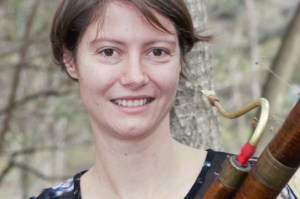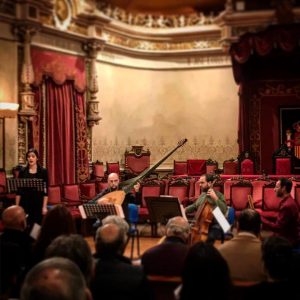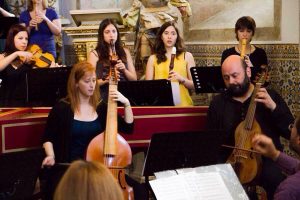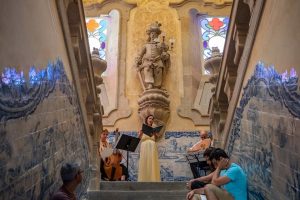Graduate Profile: Mélodie Michel, UCSC SSRC-DPD Fellow

Mélodie Michel is a musician from Paris, France, and a third-year PhD student in the Music Department. Her work combines ethnography with archival research. In 2018 she received a UC Santa Cruz Social Science Research Council Dissertation Proposal Development (UCSC SSRC-DPD) Fellowship that helped her develop her dissertation work. She used this the summer funding to conduct interviews and preliminary observations of musicians in Southern Europe. THI spoke with Michel about how her research changed over the course of the fellowship, the lives of the Early Music practitioners’ she studies, and what to do with the research that doesn’t make it into one’s dissertation.
 Congratulations on receiving a 2018 UCSC Social Science Research Council-Dissertation Proposal Development Fellowship! Your academic work is at the intersection of music, ethnography, and religious studies. Can you tell us about the research that you applied to do under this program?
Congratulations on receiving a 2018 UCSC Social Science Research Council-Dissertation Proposal Development Fellowship! Your academic work is at the intersection of music, ethnography, and religious studies. Can you tell us about the research that you applied to do under this program?
At the time of my application, I had a project based on research in three different sites: Guatemala, Ecuador and Portugal. My idea was to conduct two types of research in each place. First, archival research to explore musical manuscripts from the 17th and early 18th centuries—that are actually very similar in all these locations—in terms of the compositional stylistic approach as well as of the context in which the music was played, whether that be in monasteries, convents, or cathedrals. Secondly, musical ethnography with the actual people who are reviving these archives today: musicians, musicologists, instrument makers, etc. I wanted to discover the meaning of this rather specific repertoire—religious music in the vernacular—both at the time of its creation and today, suspecting that there could be some resonances and continuities.
The fellowship program includes workshops on campus at UC Santa Cruz as well as summer funding. How did you use the funding component in 2018? Did you find that your research took you in unexpected, unusual, or particularly surprising directions?
 The way I used my grant during the summer 2018 was to do some preliminary research in Europe to do interviews and participant observation in Southern Europe, which means not only Portugal but also Spain and Italy.
The way I used my grant during the summer 2018 was to do some preliminary research in Europe to do interviews and participant observation in Southern Europe, which means not only Portugal but also Spain and Italy.
I discovered that there was a full aspect of my research that could not be included in my dissertation, namely the interesting way in which the economic and the ideological are intertwined in early music practitioners’ everyday lives. I realized also that the impact of the economic crisis of 2008 was crucial in the organization of musical labor in the circles that I was connecting with. Still, I believe that this is a very European symptom and that it can be very different in Latin America, where the reality of the Early Music scene is so particular.
How has your dissertation research, and direction, changed as a result of the course of your DPD research?
Well, after the DPD research I had to decide what I wanted to do with my dissertation, and I realized there were many complex aspects that interested me but which would be too much to include in one single research project. I then decided that my dissertation would focus on Latin America only, and I will keep my findings in Southern Europe for a further project (maybe a book?). At the same time, I feel that my focus is already much richer and not as simplistic as it was at the beginning—at least this is how I see my initial proposal now!—and I manage to bring together more elements, in a transversal way. I will also spend some time in Chile and Mexico, which was not part of my previous plans.
I think that the preliminary research I have done, thanks to the DPD Program, will help me a lot in my further investigations. It has already helped me to publish articles, such as this piece in Analitica: “Postmodern Views on the Early Music Practice: Performance, Pedagogy, and Society.” I have learned all the tricks and mistakes of the beginner-ethnographer; both during the SSRC-DPD workshops that THI held in the winter and spring of 2018, and in the field.
You’re now a third-year PhD student at UC Santa Cruz. Can you tell us about your research this year? Where are you, what are you pursuing, and have the first two years of pre-dissertation work influenced your path to this point?
 It seems like I am not in a common situation, because as an international student I had to take my Qualifying Exam during my sixth quarter (note that the rules have now changed). Now that I am starting my third year, I am already planning on conducting my main fieldwork and starting to write my dissertation. On the one hand, I enjoy being able to go through the PhD process so quickly; on the other hand, it will be hard in some aspects, but it also means I have more freedom to follow the flow and change my perspectives. This is important to me, so in the end I am happy with the way it went.
It seems like I am not in a common situation, because as an international student I had to take my Qualifying Exam during my sixth quarter (note that the rules have now changed). Now that I am starting my third year, I am already planning on conducting my main fieldwork and starting to write my dissertation. On the one hand, I enjoy being able to go through the PhD process so quickly; on the other hand, it will be hard in some aspects, but it also means I have more freedom to follow the flow and change my perspectives. This is important to me, so in the end I am happy with the way it went.
What is for sure is that I have learned so much during these two years. For example, I discovered how the concept of decoloniality can be articulated in musical practices, and how ideologies at play in Early Music are intertwined with economical strategies developed my musician’s communities. Two years ago, I would never have imagined myself where I am now, pursuing such an exciting research!
Image credits: Mélodie Michel, taken during Michel’s 2018 research trip in Southern Europe.
